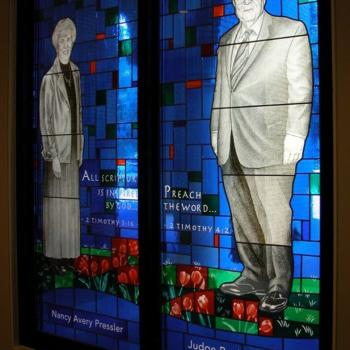This RNS commentary on the Ravi Zacharias scandal — “Ministry leaders’ rush to empathize with Ravi Zacharias is beyond alarming” — gets at a key point in the response to so many church/ministry scandals. Kyle J. Howard writes:
Instead of condemning the perverted secret life of Ravi Zacharias and empathizing with his victims, many leaders rushed to express a degree of identification and even empathy with Zacharias. From pastors to seminary professors, many declared that apart from the grace of God, they, too, would be like Zacharias. Some of these leaders even chastised others for not more readily identifying with Zacharias. …
A healthy response from someone who has been made aware of abuse is not a consideration of how they could be like the abuser, but rather a connection with the abused.
A healthy empathetic person considers the experience and pain of the victim as an image-bearer of God and may connect with an individual on a more personal level, such as, “this could’ve been me, my spouse, my child or other relatives.”
It is deeply troubling to see so many men, especially in ministry leadership, find a more immediate connection with abusers rather than the abused.
The rest of Howard’s piece turns to a longer discussion aimed at that audience of “men, especially in ministry leadership,” attempting to persuade them through chapter-and-verse scriptural arguments and a discussion of the doctrine of sanctification. But this is the compelling point: The instinctive “connection with abusers rather than the abused” as the primary response of these men.

It’s hard not to suspect that the men responding in this way are inadvertently telling on themselves. It comes across as though they’re saying, “I don’t want you to be harshly judgmental of Ravi Zacharias now that you’ve learned about his years of predatory sexual and spiritual abuse because I don’t want you to be harshly judgmental of me should you ever learn about my years of predatory sexual and spiritual abuse.”
Or as Howard says, at best, these men are telling us that they view life as a daily struggle in which only the intervening grace of God keeps them from following their own inclination to start siphoning off church funds to pay for their own secret indentured concubines. That’s not “humility,” that’s a confession.
In any case, most people are not “ministry leaders” or clergy or the “president/founder” of some eponymous spiritual empire, so most of us aren’t going to respond to the sordid revelations about Ravi Zacharias with such men’s instinctive impulse to defend a colleague and fellow-member of that exclusive club.
What most of us are thinking will be, instead, something like what Tanya Marlow writes about here: “But his books are still good, right? – 5 things Christians must stop saying about sexual abusers.”
This is a potent little essay full of fierce wisdom and truth. Marlow sets the tone right at the beginning with this clarifying statement:
Pop quiz:
If you have just found out that a famous Christian leader has been systematically sexually and spiritually abusing women throughout his entire ministry, should you be defending:
a) The sexual predator, or
b) His books?The answer, of course, is only this: the women. Nothing else.
But that’s easy for me to agree with in the case of Ravi Zacharias. He wrote more than 30 popular books which were read and admired by millions of people, but I wasn’t one of those people. I’ve never read any of those books and I’ve never been shaped or influenced in any way by Zacharias’ thinking or teaching. I’ve never even cared much for or about the whole realm of so-called “apologetics,” so I don’t even have to worry about the reverberations of his scandalous double-life in that field.
I don’t have any stake in defending Zacharias or his books or his body of work. If the books of Ravi Zacharias quietly blinked out of existence, that wouldn’t affect me at all because those books have not, in any way, affected who I think I am or how I became who I am.
And because I have nothing at stake, it’s easy for me to nod in agreement, seconding Tanya Marlow’s emphatic “No” in response to that question: “But his books are still good, right?”
That gets much, much harder and much more complicated, though, when it comes to the books and creations of other abusers whose works I have enjoyed, and learned from, and been influenced by. Forget Ravi Zacharias. What about John Howard Yoder?
I have a copy of Yoder’s The Politics of Jesus on my bookshelf, heavily underlined and annotated with marginalia that reflects the significance of the many ways that book challenged and influenced and inspired me. It was an important book to me. Reading and re-reading it shaped decisions that shaped the direction of my life. And I don’t know what to do with that, because while I had no idea at the time I was reading and underlining and wrestling with the profound ideas expressed in that book, it turns out that John Howard Yoder was a serial rapist and a deeply twisted spiritual abuser. On the page, he seemed to be a fearlessly honest theologian determined to follow the hard truths of the gospel of the kingdom wherever it led, but off the page he was a monstrous predator, like some kind of Buffy villain come to life.
That analogy comes naturally for me because I loved that show. It didn’t affect me in the same way or on the same levels that Yoder’s once-classic books did, but I’ve spent hours absorbing and revisiting stories about Buffy Anne Summers as she saved the world, a lot. My dog is named “Willow.” So it pains me to learn that Joss Whedon, the creator of that show and the teller of many other stories I’ve enjoyed and absorbed, also turns out to have been a serial philanderer, a bully, and a coercive, abusive jerk to the women he surrounded himself with.
What do I do about that?
I agree with Tanya Marlow that it’s wholly inadequate to just say: “Sure, we can now condemn the abuser. But we can still enjoy, quote and revere his words because those are really good.” She describes this response further:
This one is so insidious and pervasive that even N.T. Wright vocalized this sentiment in a much-praised interview with Justin Brierly about Jean Vanier … It’s the logic that says, “his acts were bad, but his words were good, so God can use his words and we can continue to use his words, even though they come from an imperfect source.”
… I don’t want to downplay the damage it does to ‘secondary victims’, who came to faith because of Zacharias or started work with disabled people because of Vanier. It can involve a tremendous amount of untangling and deconstruction when Christians who changed our lives turn out to be abusive of others. But however hard that may be, it is not as hard as the direct survivors of abuse, and our duty is to support them rather than avoid the pain of our own disappointment.
What does it say to survivors of abuse everywhere when the church quotes from sexual predators as authorities on human life or the things of God?
What does it say to the whole world that Christian academics will continue to read and promote the works of sexual predators as necessary as ‘important theologians’ – as though we can offer no better theology than that written by rapists? Do we hear how this sounds?
That the words of a secret abuser have helped people in the past does not mean we should continue to use those words once the abuse has been discovered.
But the challenge of this “untangling and deconstruction” may be even greater than she describes. What she goes on to say here is true, but understates the problem:
It is inconvenient to find another theologian who has said basically the same thing as someone else in a slightly less pithy phrase, but there will be one.
The inconvenience of having to change our lectures, alter our talks, the sadness of having to put aside books that have meant a lot to us and the deep disappointment of learning that teachers we revered were wolves in sheep’s clothing is significant – but it is absolutely nothing in comparison to the stab of pain that survivors have to carry each and every time they hear a sexual predator revered in the church or academe.
That slips back into the logic of “his acts were bad, but his words were good,” assuming that those words and ideas can easily be abstracted from the actions, and that those words and ideas were not in any meaningful way shaped by or tangled up with the ideas that caused those actions. It won’t do for me to simply abandon Yoder and find some substitute writer “who has said basically the same thing.” I need to explore how that basic thing was the product of the same mind that spent decades preying on women.
Maybe Yoder was the kind of sociopath who was capable of completely compartmentalizing his writing from his personal life. Maybe there are aspects of Jean Vanier’s inspiring ministry for outcasts that can be easily disentangled from his grooming of and preying on those same outcasts. Maybe it’s possible to segregate out some nuggets of argument from Ravi Zacharias that you can retain without any worry that those arguments will lead you where they led him. But maybe not and maybe not and maybe not.
“While I am proud to have my name associated with Buffy Summers,” Sarah Michelle Gellar wrote, “I don’t want to be forever associated with the name Joss Whedon.” That’s another good distinction that’s a lot more complicated than it might seem at first.
The “untangling and deconstruction” of Buffy is off to a promising start with pieces like this one, from Alison Stine, “An abusive reckoning for Buffy, a badass, occasionally feminist show created by a monstrous man,” or this one, from Marina Watanabe, “Bad Blood: The Quiet Misogyny of Buffy the Vampire Slayer.” Pieces like that help us start dealing with questions like whether what we took from Nice Guy Xander and Angel/Angelus and (maybe especially) Warren Mears was the same as what Whedon intended for them to mean, and just how different those two things are or can be.
But it’s not a simple problem. I can’t just declare that, forthwith, who I am and how I am shall be wholly untainted by any previous association with John Howard Yoder or Joss Whedon because who I am and how I am is someone shaped, in part, by my interaction with The Politics of Jesus, and with The Fullness of Christ, and with Buffy and Firefly.
If we cannot say “But the books are still good, right?” — and we can’t — then those of us influenced by those books can’t be sure that we’re all good either. This will take work.
It’s a project. It’s similar to what I half-jokingly call “The 1611 Project” — the long and difficult work of disentangling English-speaking Bible Christianity from the white supremacy that has fundamentally shaped it for as long as there has ever been such a thing as English-speaking Bible Christianity. It’s a tearing-down-and-rebuilding process. It takes time.
Test everything; hold on to the good.












